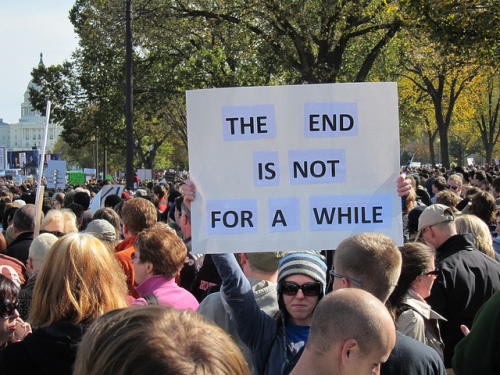
Here is the gay marriage question no-one seems to be asking: If it’s all the same, then what’s the difference? With so much talk about equality, love, commitment and stability, is there simply no difference between gay marriage and marriage between a man and a woman? Is there absolutely nothing distinctive about marriage as it has traditionally been understood?
The answer is obvious but too easily forgotten: A life-long commitment between a man and a woman is a relationship involving sexual difference, involving male-female complementarity. For this reason, it allows children to be conceived and born within the life-long union of their own natural parents, and it is a form of commitment and family life that allows children to grow up with their own natural parents over a lifetime. This simply isn’t possible for a same-sex couple.
This doesn’t mean that a man and a woman are obliged to have children, or that they are always capable of having children. It’s simply a recognition that one distinctive aspect of this kind of male-female relationship is that, in ordinary circumstances, it can involve conceiving and bringing up their own children. (It’s not uncommon to talk about the ‘distinctive characteristics’ of something, even if there are exceptions. For example, it’s a distinctive characteristic of human beings that we use language; and the fact that some human beings cannot talk or choose not to talk does not undermine this).
This is not a religious argument (appealing to the Bible, the Anglican marriage service, or the Pope); it’s not a historical or sociological argument (highlighting national traditions or cultural norms); it’s not even a moral argument (although it does have moral implications). Nor is it a crude ‘biologist’ argument, reducing people to their genitalia and their reproductive capacities, because sexuality involves the whole person and not just procreation.
It is actually a humanist argument, appealing to an irrefutable truth about human nature that any rational person can acknowledge: that children can only be conceived by a man and a woman, and that marriage between their own parents is a form of family life that will allow children to grow up within the life-long embrace of their natural mother and father.
We have a word for this kind of life-long and public commitment between a man and a woman: it’s called marriage. It doesn’t exclude the fact that there are many other kinds of relationships, some of them involving love, stability and life-long commitments; nor does it rule out other forms of family life that come about for all sorts of different reasons. We have an assortment of words to help us understand some of the distinctions (‘marriage’ being one of them), and we need these words for the sake of clarity and honesty about some of the differences there are between different kinds of relationships.
This is why it’s misleading and even deceptive to claim that allowing gay marriage would make no difference to traditional marriage and to all those men and women who are already married. It’s often asked, rhetorically: What harm would it do? What difference would it make? Is it not just about allowing more people to share in the benefits of marriage? Is it not just about adding something rather than taking something away? Are we not simply increasing rights and widening the franchise?
This is simply untrue. If marriage is redefined to include gay marriage, it means that the core understanding of marriage will no longer include that aspect of sexual difference and complementarity, and that aspect of creating a family where one’s own children may be conceived and raised (even if this doesn’t happen for every couple). The definition of marriage will be narrowed (or perhaps we should say widened) to a relationship of love, friendship and mutual support. This is not just an addition or a minor change; it is a radical undoing of marriage as it is commonly understood. It makes it impossible for a man and woman to have their marriage recognised as a union that involves sexual-difference, because they are being told – in the new definition – that their sexual difference has nothing to do with the nature of their marriage. A right has been taken away and not just added.
There is a strange and perhaps unintended effect of the proposed legislation. It will not actually allow gay people to marry (where marriage keeps its traditional meaning); it will change marriage into a form of civil partnership. It will mean that marriage as it has traditionally been understood will cease to exist; and for a man and a woman wanting to commit themselves to each other in a life-long partnership, their only option will be a form of commitment that replicates the present civil partnership commitments for gay couples.
The fact is, of course, that many men and women will continue to marry, and the majority of them will conceive and raise their own children. Marriage as it has traditionally been understood will seem to go on, but we won’t have a specific word or public institution for it any more; and the irony is that if we are not allowed to use the word ‘marriage’ we will have to invent one which describes exactly what the word marriage used to describe.
But this is not just about words and definitions. Our whole society, not just ‘the state’, has until now recognised that marriage (as a life-long commitment between a man and woman) has been a relationship that deserves special recognition and special privileges. This is not because it is the only kind of life-long or loving relationship (it’s obvious that there are many others); nor is it because society scorns these other relationships (it’s got nothing to do with homophobia or gay rights); it is simply because – to state the obvious once again – marriage between a man and a woman, unlike a same-sex relationship, allows children to grow up with their own natural parents.
This non-religious and non-moral humanistic fact does lead to a moral question: Is it good and desirable, all things being equal, for parents to conceive and bring up their own natural children, and for children to be brought up within the loving union of their own natural mother and father? Most people would say yes. This isn’t to discriminate against other forms of relationship and other forms of parenting and family life, it is simply to acknowledge the unique meaning of marriage between a man and a woman, and to recognise that this distinctive relationship brings particular benefits to individuals and to society. That’s why we have a special word for this relationship, ‘marriage’; and that’s why this relationship is ‘institutionalised’ and given a special place in our society.
To deny the distinctive nature of marriage between a man and a woman, and to promote gay marriage, is actually to deny the commonly held assumption that (all things being equal) it is good for children to be brought up by their own natural mother and father. This might seem like a big leap of logic, but it’s true: To define marriage only in terms of love, commitment, stability, etc – to make gay marriage ‘equal’ – means that there will no longer be any social or legal recognition of the particular family unit where children are conceived and raised by their own natural mother and father in a public and life-long commitment. At present, we recognise different kinds of family life, and we preserve a special place in our society for the kind of family where parents can try to raise their own natural children in the context of a life-long and public commitment, and where children can grow up with their own natural parents in this same context. If gay marriage legislation is passed, it will no longer be possible to promote the idea that marriage between a man and a woman has a distinctive meaning and a particular benefit for children and for society.
Let me try to summarise all this. The distinctiveness of marriage between a man and a woman is not something that depends on religion or tradition or morality: it is a fact of human nature and of the nature of society, that this kind of relationship (unlike a same-sex relationship) involves sexual difference and complementarity, and that this kind of relationship (unlike a same-sex relationship) is a union in which parents can conceive and raise their own natural children – even though there may be particular reasons why a particular couple are unable to do this.
But the argument against gay marriage is a moral one, because it involves what is understood to be good for children, for family life and for society. This is not because of any prejudice against gay people; it is because society recognises the particular benefits that come when children can be brought up by their own mother and father in a loving and life-long relationship, in a commitment that has been made to each other and before others. This isn’t always possible; but when it is possible, it’s a good thing – to be loved by your own natural mother and father, and to be supported by their own continuing love for each other; to love your own children, and to know the continuing love of the person with whom you conceived these children. Very few people would deny that these are good things, for individuals and for society, even if they are sometimes difficult to achieve. That’s why we should acknowledge the particular relationship that can allow and nurture them. That’s why we should keep marriage as it is.
[Last edited – in response to feedback – on 19 Dec 2012]
Read Full Post »











Catholic Voices Blog: sign up for the latest posts
Posted in Politics, Religion, tagged blogging, Catholic Voices, Catholic Voices Blog, Catholic Voices Comment on December 21, 2012| 1 Comment »
The Catholic Voices Blog seems to be posting a bit more regularly over the last few weeks. It’s a good source of information and comment on some of the fraught cultural and political issues of the day. You can visit here, and sign up for email feeds in the right-hand column.
Share this:
Read Full Post »